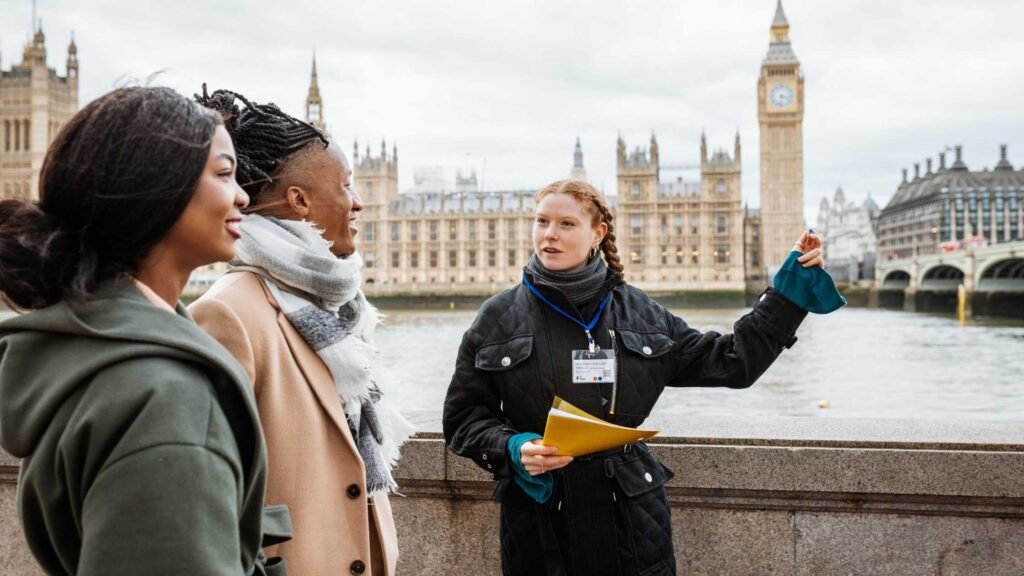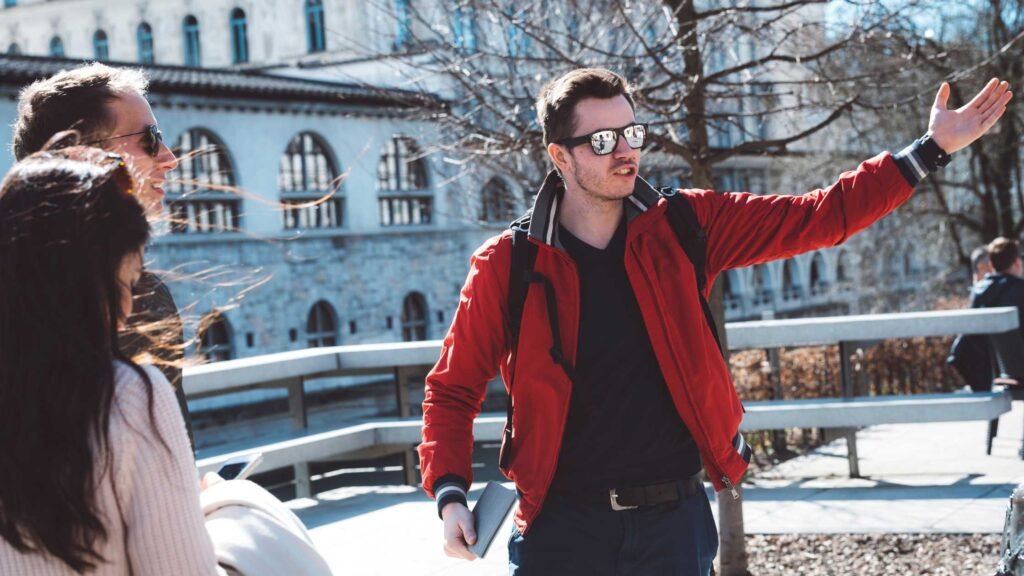Tour guides educate tourists by providing insightful commentary and factual information about sites and attractions. They use engaging storytelling to enhance the learning experience.
Exploring new destinations often comes with a thirst for knowledge about the local culture, history, and landmarks. This is where tour guides shine, offering a wealth of information to curious travelers. These local experts are trained in the artistry of blending educational content with entertainment, ensuring that the facts they share are not only accurate but also captivating.
With their expertise, tour guides bring to life the stories behind the sights, creating memorable experiences for their audience. As storytellers and educators, they adapt their delivery to suit the interests and engagement levels of the group, often making complex histories accessible and intriguing. Let’s explore about”What Way Do Tour Guides Educate the Tourists?”
Their narratives are designed to provide a deeper understanding and appreciation of the places being visited, making each tour not just a journey but a rich learning opportunity.
Table of Contents
Toggle- Introduction To Tour Guides And Tourist Education
- Foundations Of Tourist Education
- Methods Of Delivering Information To Tourists
- Engaging Tourists Through Interactive Learning
- Overcoming Language Barriers And Cultural Differences
- Responsibilities Of A Tour Guide In Tourist Education
- Training And Certification For Tour Guides
- Tools And Resources For Tour Guides
- Tourist Engagement And Feedback
- Challenges Faced In Educating Tourists
- Conclusion And Future Of Tourist Education
- Frequently Asked Questions For What Way Do Tour Guides Educate The Tourists
- Conclusion
Introduction To Tour Guides And Tourist Education

Welcome to the world of tour guides and tourist education. This crucial aspect of travel transforms simple sightseeing into immersive learning experiences. Tour guides are the key to unlocking the secrets of local culture, history, and attractions. They don’t just lead the way; they educate and inspire. Let’s explore how this important role enhances any journey.
The Role Of Tour Guides In Enhancing Tourist Experience
Tour guides bring destinations to life. With vast knowledge and engaging storytelling, they create unforgettable memories for travelers. Their expertise covers local customs, historical context, and fun facts that you won’t find in guidebooks. A tour guide’s role is diverse:
- Navigating routes for safe and efficient travel.
- Providing insider tips on the best spots to visit.
- Adapting tours to suit the interests of diverse groups.
- Ensuring safety and comfort throughout the journey.
A great guide enhances the tourist experience by turning a trip into an educational adventure.
The Importance Of Educating Tourists
Educating tourists is not just about sharing facts. It’s about building a deeper connection with the place. Education fosters respect for cultures and environments, leading to responsible tourism. Here are some benefits:
- Preservation of heritage: Knowledgeable tourists are more likely to respect and help conserve historical sites and traditions.
- Environmental awareness: Understanding local ecosystems encourages eco-friendly practices.
- Cultural sensitivity: Learning about customs reduces cultural misunderstandings and promotes harmony.
Tourist education, therefore, is essential. It shapes experiences that go beyond mere enjoyment, enriching both the traveler and the destination.
Foundations Of Tourist Education

Tour guides play a key role in enhancing a tourist’s experience. They provide insight into the local environment. They make sure the tourists leave with a wealth of knowledge.
Knowledge Of Local History And Culture
Guides share fascinating stories about the area’s past. This helps make the experience memorable. They use visual aids like maps and replicas. This helps connect tourists with historical events. They also cover local traditions and customs. This can include dances, music, and even cuisine. Such experiences enrich the understanding of the local culture.
Understanding Tourists’ Learning Preferences
Effective tourist education means knowing different learning styles. Tour guides adapt their approach based on the group’s preferences. This ensures everyone stays engaged. They use a mix of storytelling, hands-on activities, or multimedia presentations. They create a personalized learning environment. This approach attends to auditory, visual, and kinesthetic learners.
Methods Of Delivering Information To Tourists
Engaging tourists and sharing knowledge is key to a memorable tour experience. Tour guides have developed various methods for delivering information to make each trip educational and interesting. Engaging stories, interactive activities, and modern technology all play a part in enriching the tourist’s journey.
Storytelling Techniques Used By Tour Guides
Storytelling breathes life into historical sites and cultural landmarks. Good tour guides become storytellers, transforming facts into captivating tales. Here are some methods they use:
- Descriptive Language: Vivid descriptions create mental images that immerse tourists in the scene.
- Dramatic Pausing: Pauses build anticipation and emphasize key points.
- Character Voices: Different voices for historical figures add personality and entertainment.
- Emotional Engagement: Connecting stories to human emotions makes information relatable.
Incorporating Technology In Tour Guide Education
Today’s guides often use technology to enhance learning. Here’s how:
- Audio Guides: Offer detailed commentary in multiple languages.
- Mobile Apps: Provide interactive maps and additional facts at tourists’ fingertips.
- Virtual Reality (VR): Brings history to life with immersive 3D experiences.
- Social Media: Shares engaging content and behind-the-scenes insights.
By blending traditional methods with digital innovations, tour guides create a rich educational landscape for every traveler.
Engaging Tourists Through Interactive Learning

Welcome to the interactive world of learning where tour guides transform each tour into an engaging classroom. Modern travel experiences are about more than just seeing sights; they’re interactive and educational journeys. This section dives into how tour guides educate tourists with innovative teaching methods to create engaging touring experiences.
Use Of Visual Aids And Hands-on Experiences
Visual aids are key to making historical tales and facts more digestible. Guides often use items like maps, replicas, and pictures to enhance storytelling. By seeing visuals, tourists engage more deeply with the environment around them. Imagine holding a replica of an ancient artifact in your hands—this tactile approach brings history to life much more vividly than words ever could.
- Bolded maps show historical boundaries vs. modern lines.
- Pictures from the past tell stories of how locations once looked.
- Replicas of artifacts invite direct interaction.
These strategies foster a connection between the tourist and the subject matter, making the experience both memorable and enjoyable.
Creating Memorable Learning Moments
Tour guides are experts at turning information into memorable learning moments. They often use stories and anecdotes that resonate on a personal level. By doing this, the data turns into sharable, memorable stories.
- Emphasize noteworthy events at specific spots.
- Highlight unsung heroes with connections to the locality.
- Encourage questions to foster engagement and curiosity.
These learning moments aren’t just about memorizing facts; they’re about understanding a place’s essence. The emotional connection crafted through storytelling ensures tourists leave with the knowledge that sticks.
Overcoming Language Barriers And Cultural Differences

Tour guides play a vital role in educating tourists. They bridge the gap between diverse cultures and languages. With travelers from around the globe, guides must overcome language barriers and cultural differences to provide an enriching experience.
Utilizing Multilingual Skills And Translation Devices
Knowledge of multiple languages equips guides to communicate effectively. They share facts and stories in a language the tourists understand. For languages they don’t speak, translation devices come to the rescue. These gadgets translate guides’ words in real time. This ensures everyone stays engaged and informed.
- Language apps: Helpful for quick translations.
- Handheld translators: Portable and easy to use on the go.
- Ear translators: Provide instant translation directly to the listener’s ear.
Adapting Educational Content For An International Audience
Tour content must resonate with an international audience. This involves adapting stories and information that transcend cultural boundaries. It is not just about the language but also about the context and relevance of the information. Guides use relatable examples and avoid culturally sensitive topics. They aim to provide a universal appeal.
| Strategy | Brief Description | Benefits |
|---|---|---|
| Visual Aids | Images, maps, and symbols that cross language barriers. | Enhance understanding and retention. |
| Storytelling | Sharing universal stories that connect with all. | Builds a bond with the audience. |
| Inclusive Topics | Content that is relatable to people from various backgrounds. | Promotes inclusivity and interest. |
By tailoring approaches and employing technological aids, tour guides ensure tourists from different cultures have a memorable and educative journey.
Responsibilities Of A Tour Guide In Tourist Education
Tour guides play a vital role in shaping tourists’ experiences and understanding of new places. They educate visitors about cultural sites, natural wonders, and local customs. Moreover, they ensure that tourists gain valuable insights while fostering respect for the environment and cultures. Let’s explore the key responsibilities that tour guides hold in educating their groups.
Ensuring Accuracy And Reliability Of Information
Tour guides are the link between the destination and the visitor. They must provide facts that are both accurate and reliable. This means:
- Researching extensively about the site’s history
- Staying updated with the latest findings
- Correcting common myths or misconceptions
Guides enrich the tourism experience through well-informed narratives. Trustworthy information enhances the tour’s value.
Promoting Responsible Tourism And Ethical Behavior
Educating tourists about responsible travel is crucial. Guides encourage behaviors that protect the local environment and economy. They teach:
- Respect for local cultures and traditions
- Best practices for environmental conservation
- How to support the local economy responsibly
Through guidance, tourists learn to minimize their footprint and contribute positively to the areas they visit.
Training And Certification For Tour Guides
Behind every knowledgeable tour guide, lies a strong foundation of expert training and certification. These qualifications are essential in shaping informative and engaging tours. Tour guides require both academic knowledge and practical expertise to excel in their profession.
Educational Programs And Workshops
Many institutions offer specialized educational programs for aspiring tour guides. These programs typically cover history, culture, and customer service. In addition, guides learn about safety protocols.
- History and Culture Courses: Enhances understanding of local and global heritage.
- Language Training: Equips guides with communication skills in multiple languages.
- First Aid Certification: Prepares guides for emergencies.
- Customer Service Sessions: Focuses on delivering exceptional experiences.
Workshops also provide hands-on learning opportunities. Guides practice real-life scenarios to refine their skills.
Importance Of Continuous Learning And Development
Tour guiding is a dynamic field. Ongoing learning keeps guides up-to-date with the latest trends.
| Continuous Professional Development | Benefits |
|---|---|
| Online Courses | Accessibility of new learning resources |
| Networking Events | Exchange ideas with industry peers |
| Annual Certification Renewal | Maintain credibility and reliability |
Mentorship programs are also beneficial. Experienced guides impart wisdom to new guides. A commitment to learning guarantees tourists receive accurate and current information.
Tools And Resources For Tour Guides

Tour guides play a pivotal role in enhancing the tourist experience by providing education and insights about the destinations. At their disposal, they have an array of tools and resources designed to deliver information effectively and create an engaging experience. Let’s explore some essential tools and resources that empower tour guides to bring their stories to life.
Books, Maps, And Other Educational Materials
Nothing beats the authenticity of physical educational materials. Tour guides often rely on a variety of such tools:
- Books: Packed with historical facts, local lore, and anecdotes.
- Maps: Essential for navigation and storytelling.
- Brochures and flyers: Offering quick snapshots of interesting places.
These materials not only serve as visual aids but also as tangible souvenirs for tourists to take home.
Leveraging Mobile Apps And Digital Technology
In today’s digital world, tour guides are embracing technology to enhance their tours:
- Mobile apps: Interactive elements like quizzes, AR experiences, and navigation.
- Audio guides: Offering detailed commentary in multiple languages.
- Social media: For sharing live updates and connecting with tourists.
Such technologies provide an immersive learning environment that is both dynamic and accessible.
Tourist Engagement And Feedback
Tour guides play a crucial role in shaping the tourist experience. They not only share knowledge but ensure that travelers stay captivated and involved. Engaging tourists isn’t just about imparting facts—it’s about creating a dialogue. Feedback from tourists is like a compass, guiding the tour’s success. In this section, we’ll dive into how tour guides can gather valuable feedback and foster interaction.
Gathering Tourist Feedback For Improvement
Collecting feedback from tourists is vital for continual improvement. Here’s how guides can effectively receive input:
- Surveys: Simple questionnaires post-tour get firsthand experiences.
- Digital platforms: Online reviews offer insights and widen reach.
- Conversation: Casual chats reveal immediate thoughts and suggestions.
Such feedback pinpoints what works and what needs tweaking. Thus, making every tour better than the last.
Interactive Q&A Sessions During The Tour
Tours should be interactive, letting tourists ask questions enriches the experience. Here are ways to integrate Q&A sessions effectively:
- Structured intervals: Regular breaks for questions keep everyone engaged.
- Encourage participation: Inviting questions opens a two-way street.
- Share stories: Real-life examples spark curiosity and interaction.
This approach ensures tours are not just informative but interactive and memorable.
Challenges Faced In Educating Tourists
Guiding tourists through the wonders of a new place is an art form. Tour guides face many challenges while educating their groups. These obstacles can shape the experience for everyone involved. In this section, we explore some key challenges and how guides can overcome them.
Dealing With Diverse Group Dynamics
Diversity in group composition can make education a complex task for tour guides.
- Language barriers sometimes prevent clear communication.
- Cultural differences may influence the interests and engagement levels of tourists.
- Age differences also affect the pace and focus of the tour content.
To manage diverse dynamics, guides often use storytelling and interactive methods. These keep all members interested and involved.
Managing Time Constraints And Information Overload
Tour guides work against the clock, balancing timely tours with educational content.
Time constraints can lead to rushing, which may result in tourists missing out on valuable information. Meanwhile, an overload of facts can overwhelm and confuse.
To mitigate these issues, guides prepare concise, impactful narratives. They pick key highlights and create a balance between learning and exploring.
Ensure each sentence is readable to a 9-year-old, is SEO-friendly, and not too complex.
Conclusion And Future Of Tourist Education
Tourist education stands on the brink of transformation. Let’s explore the exciting road ahead for tour guides and travel education.
The Evolving Role Of Tour Guides In The Digital Age
Tour guides today are more than storytellers. They become tech-savvy navigators. Interactive apps, augmented reality, and online resources enrich visitor experiences.
- Technology brings stories to life: Historical facts pair with vivid illustrations.
- Personalization is key: Digital tools tailor tours to individual interests.
- Global connections expand knowledge: Guides link local tales to worldwide events.
Anticipating The Future Needs Of Tourist Education
Looking ahead, travel learning must adapt. Curiosity grows; so must educational methods. Here’s what to expect.
| Aspect | Future Direction |
|---|---|
| Interactivity | More hands-on experiences and simulations |
| Sustainability | Educating about eco-tourism and conservation |
| Digital Learning | Virtual reality tours and online learning modules |
Tour guides will continue to evolve. They will combine knowledge with digital prowess. This ensures memorable, meaningful travel. Stay excited for what’s to come!
Frequently Asked Questions For What Way Do Tour Guides Educate The Tourists
How Do Tour Guides Help Tourists?
Tour guides enhance visits by offering expert knowledge, ensuring safety, managing logistics, and enriching the overall travel experience. They also assist with language barriers and cultural etiquette.
What Does Being A Tour Guide Teach You?
Being a tour guide enhances communication skills, cultural knowledge, and customer service abilities. It fosters adaptability, problem-solving techniques, and time management expertise. Tour guiding also teaches you local history and storytelling proficiency.
What Is The Role Of Guide In Tourism Development?
Guides are pivotal for tourism development as they enhance visitor experiences and satisfaction, represent cultural ambassadors, and foster sustainable practices while also stimulating local economies.
How Do Tour Guides Play An Important Role In The Tourism Value?
Tour guides enhance the tourism experience by providing insightful information, ensuring safety, and fostering cultural understanding. Their personal touch and expertise add significant value to travelers’ journeys, making visits more memorable and engaging.
Conclusion
Tour guides are pivotal in enriching tourist experiences. Through storytelling and expertise, they unveil a destination’s heart and soul. They offer cultural insights and history, making visits memorable. Always choose a knowledgeable guide for an immersive journey. Treasure the learning as much as the sights.



